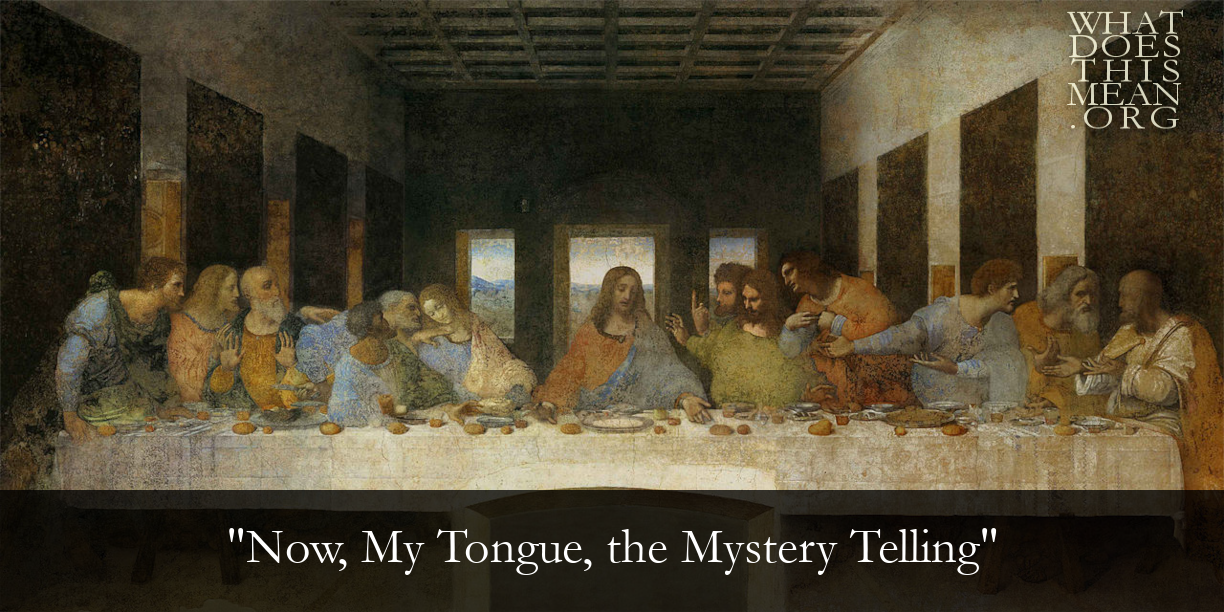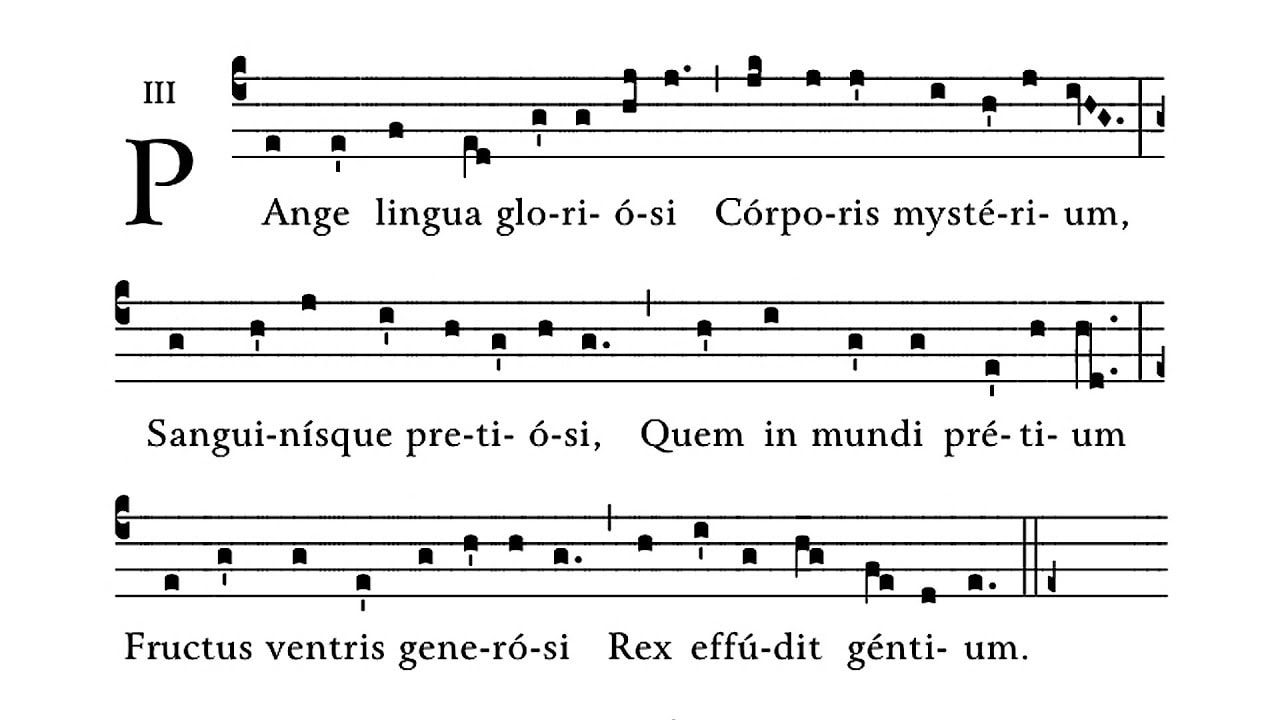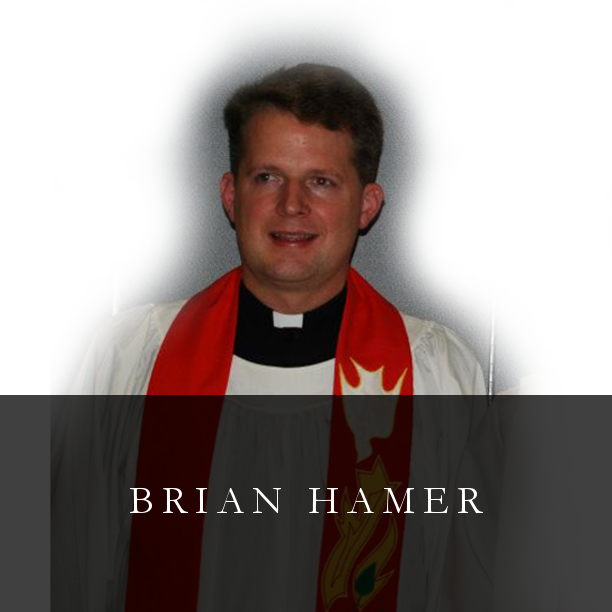Clasping Himself in His hands, the food Himself now eats.
Josquin’s final published Mass, Missa Pange Lingua, is a paraphrase mass, i.e., a mass in which each voice imitates the music of a pre-existent chant. In this particular case, Josquin drew upon the music of the following chant with a text by St. Thomas Aquinas (adapted from the Latin hymnist, Fortunatus) for the Corpus Christi Festival (the Thursday following Trinity Sunday), with its trademark procession of the Body of Christ through the streets of Europe.
1 Now, my tongue, the mystery telling
of the glorious body sing,
and the blood, all price excelling,
which the Gentiles' Lord and King,
in a Virgin's womb once dwelling,
shed for this world's ransoming.
2 Given for us, and condescending
to be born for us below,
he, with us in converse blending,
dwelt the seed of truth to sow,
till he closed with wondrous ending
his most patient life of woe.
3 That last night, at supper lying,
'mid the Twelve, his chosen band,
Jesus, with the law complying,
keeps the feast its rites demand;
then, more precious food supplying,
gives himself with his own hand.
4 Word-made-flesh, true bread he maketh
by his word his flesh to be,
wine his blood; which whoso taketh
must from carnal thoughts be free:
faith alone, though sight forsaketh,
shows true hearts the mystery.
5 Therefore we, before him bending,
this great sacrament revere:
types and shadows have their ending,
for the newer rite is here;
faith, our outward sense befriending,
makes our inward vision clear.
6 Glory let us give and blessing
to the Father and the Son,
honour, might, and praise addressing,
while eternal ages run;
ever too his love confessing,
who, from both, with both is One. Amen. (translation composite)
Lord, have mercy upon us.
Christ, have mercy upon us.
Lord, have mercy upon us.
Readers who wish to explore the entire Mass are invited to scroll down a bit further to enjoy a wonderful interpretation by The Tallis Scholars. For those who prefer to explore this heady music in small doses, I would like to skip ahead to the Agnus Dei.
Most of the movements of this Mass begin with literal quotations from the Pange Lingua chant, but the entire tune does not appear until near the end, in the last section of the Agnus Dei, when the superius (the highest voice) sings it in its entirety, in long notes. Here Josquin briefly returns to the cantus firmus style of the middle 15th century, where one voice holds (tenere) the melody, complemented by the other voices. The 1539 publisher even added the hymn's text under the notes at this point in the score to alert the reader to this unique musical reference to the original chant. Using the image below the text, perhaps you can find the melody in the following video?
Lamb of God, you take away the sins of the world, have mercy on us.
Lamb of God, You take away the sins of the world, have mercy on us.
Lamb of God, You take away the sins of the world, grant us peace.
The following recording contains all six stanzas of the hymn (please see the complete text of the chant above), so enjoy or ignore the fifth stanza as your faith tradition dictates. As for the five “Lutheran” stanzas, the hymn endures and enriches our hymnody with its focus on the dual mystery of the incarnation and the ongoing mystery of His sacramental presence among us. As the eucharistic text quoted at the head of this article describes so beautifully, the King is at once the host (hostia = sacrifice) and the main entrée—O great mystery for human tongues to tell!
Extra Choral Credit: Hearing the Entire Missa Pange Lingua
The full text of the Ordinary of the Mass is readily available online or perhaps in your hymnal. And rest assured that Josquin will not let you down, nor will Peter Phillips and The Tallis Scholars in this recording. Starting times for each movement are given below. As you listen, I encourage you to hear the initial theme of each section, and then, as additional voices enter, to enjoy the tapestry of glorious choral music, each voice veritably weaving its way to heaven—freely, gently, and cheerfully, as befits an enduring “master of the notes.”
| 1 | Kyrie | 0:00 |
| 2 | Gloria | 2:58 |
| 3 | Credo | 7:19 |
| 4 | Sanctus | 14:22 |
| 5 | Agnus Dei | 22:21 |




 RSS Feed
RSS Feed
